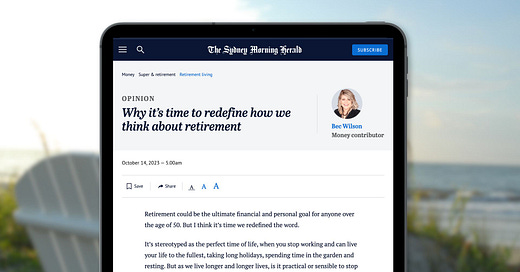Why it’s time to redefine how we think about retirement
My suggestion is that we all start to think about retiring as a stepped process that gradually moves us along a retirement continuum, slowly and incrementally morphing our way of living.
Every Sunday I write a column that is published in the money section of The Age, The Sydney Morning Herald, Brisbane Times and WA Today. This week’s column can be read in full here.
Retirement could be the ultimate financial and personal goal for anyone over the age of 50. But I think it’s time we redefined the word.
It’s stereotyped as the perfect time of life, when you stop working and can live your life to the fullest, taking long holidays, spending time in the garden and resting. But as we live longer and longer lives, is it practical or sensible to stop working completely? Or should we contemplate a different way of thinking about retirement, one that sees us retire more gradually and enjoy the period before retirement as much as the period after it?
My suggestion is that we all start to think about retiring as a stepped process that gradually moves us along a retirement continuum, slowly and incrementally morphing our way of living, and our income into a retired state over many years, if we can. That would allow us to enjoy the benefits of work, like social engagement and pursuit of meaning, which have been shown to positively impact our health and wellbeing.
At the heart of this continuum is the definition of modern retirement. I define modern retirement as the time in life when we can afford to live off various sources of passive income and choose what we do with our time. That choice should, where possible, include staying in the workforce if we like, both for financial and personal reasons.
But it would be a choice at that point, not an obligation or need. And for it to be a choice we need to have a level of financial confidence and security, which most people establish over time, as they learn to live on their combined income from the age pension, superannuation account-based pension and investment incomes.
Think about how the continuum really could work for you. At the beginning of the continuum you might still be engaged in traditional full-time work, but you know you can start to draw some income from more passive sources. You might start by dropping a day a week of work to spend with a grandchild or participating in community activities you really enjoy and build confidence in living on that smaller passive income while still earning a wage for four days.
Full and structured retirement might not actually be the ultimate goal for incoming generations - but living a life of choice can be.
Then, months or years later, you might drop a second day, or even a third, picking up hobbies you love, spending more time on your health, or in your community. Maybe you even start a small business.
As you move down the retirement continuum, you can pursue less and less formal work, but you don’t necessarily have to stop working. There are plenty of options for part-time work, flexible work arrangements, and reduced hours allowing you to take longer sabbaticals too. The key is that you don’t have to put yourself into full retirement to have balance and leisure time in your life.
There are two small problems with this under the current rules. The first is that the government currently requires a rather rigid shift into retirement to move your superannuation into retirement phase. But, the reality is that you only have to meet the conditions of release once in your life to move your superannuation into a state where it can provide that income. And before that, you could consider a transition to retirement pension.
The second is that once you reach pension qualification age at 67, your pension income will decrease after you earn more than $11,800. To me, this just becomes an important time for a cost-benefit analysis that takes in how you value work in your life, both financially and from a fulfilment perspective.
This article continues. Read it here on the Sydney Morning Herald. It’s free to access the article - you may need to register.
And just in case you missed it, here’s a link to this week’s Epic Retirement Newsletter.
I hope you’ve had a lovely weekend! Don’t forget to subscribe for my new podcast, Prime Time with Bec Wilson at www.primetimers.net. It launches Thurdsday!
Many thanks! Bec Wilson
Author, columnist, retirement educator, and keynote speaker
Introducing our new podcast: Prime Time with Bec Wilson
Our late forties, fifties, sixties and even early seventies are our Prime Time! These are our best years. Grab them with both hands! Understand how money, meaning, health and happiness works so you get the best out of them. Join me weekly! It's free
How to Have an Epic Retirement is the ultimate guidebook for modern retirees. It is grounded in my own widespread research on modern retirement, and draws on my prior ten years as the CEO of Starts at 60 and Travel at 60 (before I stepped away to pursue my next career in retirement education). It also draws on the work of the leading thinkers in the longevity, health, happiness, purpose and modern ageing spaces and incorporates many interviews with people who have navigated the sometimes challenging path into retirement.
How to Have an Epic Retirement is officially a bestseller in Australia! You can buy it at all major booksellers. Or get your copies at one of the largest online booksellers below.











Your info is so enlightening.